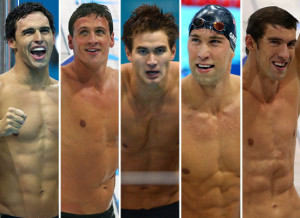Now that I have caught your attention with such an intriguing question, I can explain to you how science does not agree that swimmers are as “hot” as we think they are. Whether you swim competitively or once or twice over the summer to get a good tan, we all know it takes a good bit of energy to stay afloat. You may or may not be wondering where all of the energy from swimmers goes once it leaves our body. Is there a relationship between swimmers and the temperature of the water in the pool? Well believe it or not, there is a little thing called science behind it all.
Energy cannot be created or destroyed, but it can be converted from one form to another, which is stated by the Law of Conservation of Energy. In 1840, James Prescott Joule began experimenting with this theory, and even created an “apparatus in which a weight (1) running over a pulley (2) pulls on a rope (3) and spins a paddle wheel so it agitates water inside a closed container (4), heating it up by a small amount”. After repeating the experiment multiple times to make sure is results were accurate, “Joule calculated that the potential energy lost by the falling weight was exactly the same as the heat energy gained by the water in the container”. In short, the energy that was “lost” was exactly the same amount that was “gained”, and end up canceling each other out. The amount of energy that swimmers put into the water is the same amount of energy that gets converted into warmer temperatures.
Science can be applied to any part of our daily lives; for example, the Law of Conservation of Energy can be applied to swimming to find out if swimming warms the temperature of the pool. Intense swimming during practice or just for exercise causes people to sweat and burn off energy, which we can assume goes straight into the water. If the water is 20°C (68°F) to start with and we need a temperature rise of 80°C (176°F), and knowing it takes an hour to give us 0.007°C (32°F), we’d need swimmers to keep going for 11,200 hours”.
That is equal to 466 days, or about a year and three months.
In conclusion, ‘yes’ swimmers do make the pool warmer, but not nearly enough to make the slightest difference in the temperature.
Now that you know what effect swimmers have on the temperature of the water, you may be wondering if it is better for swimmers to train in warm water or chilly water. When swimming in cold pools, you need to allow more time for your body to warm up. In pools under 60°F, blood vessels in the body close up to keep the heat in, but eventually they will need to open back up to regulate the blood flow. When they open, cold blood will begin to run through the veins and once that blood reaches the organs, the swimmer is at risk of hypothermia.
According to SFGate, “Two studies of athletes competing in long-distance, open-water swims found that most of them were suffering mild hypothermia by the end of the race, even when the water temperatures were in the 60s or higher. 11 participants in a 2000 Alcatraz swim were studied and found that five were suffering mild hypothermia by the end of the event. And perhaps more concerning, their temperatures continued to drop after they got out of the water”.
Water that is 90°F, however, is too warm and can lead to overheating and exhaustion. When swimming for a long period of time or doing a tough workout, your body temperature increases and results in more sweat and quicker dehydration. “Profuse sweating can lead to an imbalance of electrolytes, which can effect muscle mobility”, according to Livestrong. As a swimmer myself, I know how hard it can be to swim outside on those hot, summer days with the sun shining bright. It may start off with being a little light-headed, but can eventually lead to heat exhaustion and nausea.
A study written in “The Journal of Sports Medicine and Physical Fitness”, from 1993, states that 70°F is an ideal temperature to swim in because the human body adjusts better to cooler water. The best temperature ultimately depends how strenuous the swimming is, how long the workout lasts, and personal preferences of the swimmer.
When it comes to whether or not swimmers heat up the pool with their energy, there is a possibility for reverse causation. Depending on the temperature of the pool could affect how much energy swimmers exert, which brings us to figuring out the “perfect” temperature to swim in. However, there are no third variables likely to come into play.
To answer the initial question, swimmers are indeed hot, even though swimming pools don’t really seem to be affected by it too much.


